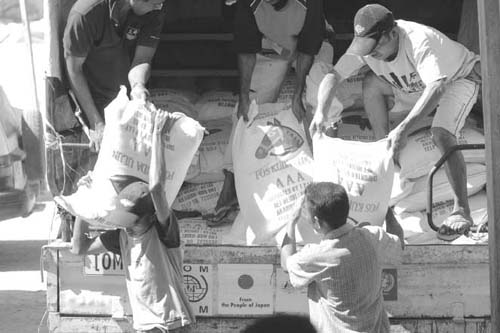Japan's Official Development Assistance White Paper 2006
Main Text > Part II ODA DISBURSEMENTS IN FISCAL YEAR 2005 > Chapter 2 Details about Japan's ODA > Section 2. Measures for Each of the Priority Issues > 3. Addressing Global Issues > (4) Food
(4) Food
Approximately 850 million people in the world are suffering from hunger,36 and approximately 300 million of them are children. Every five seconds a child dies of causes related to hunger. The Rome Declaration adopted at the World Food Summit and the MDGs set a target of reducing by half the proportion of people who suffer from hunger by 2015. Meanwhile, the need for food aid has been growing due to conflicts, natural disasters, economic crises, and other problems.
Japan, as mentioned earlier, has provided food aid to developing countries faced with food shortages and has supported efforts to improve the food productivity of the developing countries as a mid- to long-term effort. Food aid is implemented from a humanitarian viewpoint to help those who suffer from hunger. In FY2005, Japan disbursed a total of ¥11,085 million in Food Aid (KR) to countries faced with food shortages, such as those in Africa. Of this amount, ¥5.48 billion was provided in the form of bilateral assistance to Mali, Ethiopia, Eritrea, Angola, Nepal, Haiti, and other countries, and ¥5,605 million was donated to Sudan, Kenya, Uganda, Afghanistan, Timor-Leste, Palestine, and other countries through the WFP and the United Nations Relief and Works Agency for Palestine Refugees in the Near East (UNRWA). Japan has been making an active contribution to the WFP in particular, by extending US$160.53 million in 2005, including Food Aid through WFP, making Japan the third biggest donor after the United States and the European Commission.

Food assistance for domestic refugees in Timor-Leste (Photo: IOM)
Food distribution is important for people whose survival is at stake in an emergency situation. On the other hand, food assistance through projects is important for promoting the self-help efforts of the recipient countries. Japan is providing assistance to projects implemented by the WFP, such as the provision of school meals for example.
Of the children in the world suffering from malnutrition, 170 million cannot get meals at school and 130 million are not going to school at all.37 School feeding fills their stomachs and improves the nutritional condition of children, allowing them to fully concentrate on their studies, thus improving their lesson attendance rate and understanding of lessons. By supplying children at school with take-home rations, such programs can also assist their families and promote their understanding of education. In particular, the provision of school meals and the distribution of rations to girls leads to an improvement in the school attendance rate of girls.


 Next Page
Next Page